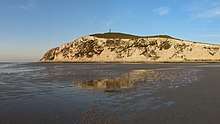Cap Blanc-Nez
Cap Blanc-Nez (literally "Cape White Nose" in English; from Dutch Blankenesse, white headland) is a cape on the Côte d'Opale, in the Pas-de-Calais département, in northern France. The cliffs of chalk are very similar to the white cliffs of Dover at the other side of the Channel in England. Cap Blanc-Nez does not protrude into the sea like a typical cape, but is a high point where a chalk ridge has been truncated by the sea, forming a cliff that is topped by the obelisk of the Dover Patrol Monument, commemorating the Dover Patrol which kept the Channel free from U-boats during World War I.

Cap Blanc-Nez was a vital measuring point for the eighteenth-century trigonometric survey linking the Paris Observatory with the Royal Greenwich Observatory. Sightings were made across the English Channel to Dover Castle and Fairlight Windmill on the South Downs. This Anglo-French Survey was led in England by General William Roy.
Some miles away to the southwest of Cap Blanc-Nez is the taller Cap Gris-Nez.